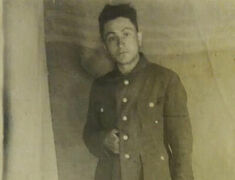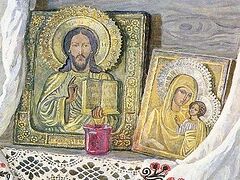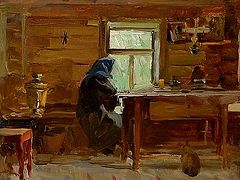Many are the afflictions of the righteous: but the Lord delivereth him out of them all. He keepeth all his bones: not one of them is broken. The Lord redeemeth the soul of His servants: and none of them that trust in Him shall be desolate
(Psalm 33)
I recently met a woman who told me the story of her family, her grandfather and father. So I decided to write it down. Here is the story of her grandfather, Feodosy (Todos) Semyonovich Zhezherun.
He lived in the Vilshana (in Russian: Olshana) estate in the Kiev province. Now it is the village of Zhuravka of the Gorodishche district in the Cherkasy region, central Ukraine. Unfortunately, it’s not possible to establish the date of his birth, but it was the late nineteenth century. The family was well off. They had fields and a mill. Grandfather founded the Tikhiye Verby farm, which later became a village and still exists today under the same name.
Feodosy had an excellent ear and voice, loved music, and made a guitar, a mandolin and a balalaika with his own hands. All his three sons knew how to play them. He also had three daughters, all of whom sang well. Two of his sons were named Ivan. When the eldest son was born, he was named Ivan. A few years later, on July 5, two days before the feast of Nativity of St. John the Baptist, a second son was born. Feodosy named him Ivan, in honor of the great prophet [St. John the Forerunner. Ivan is John in Russian]. The family distinguished between them by simply calling the elder brother Ivan, and the younger Vanya [a diminutive form of the name Ivan.—Trans.].
Grandfather was very religious: he built a church in honor of Great-Martyr Parasceva in the village where he served as a churchwarden and a choir-director. During perestroika this church, which had been razed to the ground by the Bolsheviks, was restored.
His fellow villagers and farmers respected him very much. Although the name Feodosy [Russian for Theodosius.—Trans.] was not very common at that time in Ukraine, fellow villagers named their sons Feodosy in his honor.
Grandfather raised his children in the faith and instructed not only his daughters but also his sons to keep their virginity until their wedding day. Once his eldest son, already a student, went to a wedding party in a neighboring village where he went on a spree and didn’t come home that night. Then grandfather flogged him with a pair of reins for that.
During the First World War, Feodosy went to the front. He was badly wounded on the battlefield and managed to bandage himself, after which he lost consciousness from loss of blood.
He regained consciousness in Austrian captivity, in a hospital. The Austrian doctors asked him for a long time who had given him first aid because the dressing was done so competently that it was really astonishing—they couldn’t understand how a bleeding and half-conscious man was able to stop the bleeding. It was the Lord Himself Who helped Feodosy escape death!
Next to him lay a wounded Austrian artist who painted Feodosy’s portrait in coal. It was a striking portrait. Grandfather was handsome, stately and with a luxuriant mustache, like Stolypin's. This portrait was kept in the family for a long time.
Feodosy returned in 1918 to find himself in another country. The church that he had built was destroyed. His son-in-law, who returned from the front after the Treaty of Brest-Litovsk, had burned all their documents. Apparently, the family had something to hide from the new government. Both grandfather and his son-in-law had fought in the imperial army. One of the photographs from the funeral depicts two ladies, apparently their close relatives. But they don’t look like peasant women at all. Unfortunately, the family kept the secret carefully, and the descendants never learned the whole truth about their ancestors.
Workers loved grandfather dearly for his love of his fellow man, honesty and faith. When the family was going to be dispossessed, one of grandfather's former farmhands, who was close to the Bolshevik circle, managed to replace the documents before they were sent. So at the very last moment the Lord saved them from being dispossessed.
After all that he had experienced, grandfather began to behave like a simpleton. He had icons in his house, and he prayed openly before meals, and even the day of his death was revealed to him beforehand. Of course, as a “fool” he was the last person to be accused of anything!
After the death of his wife in 1942, grandfather lived with his eldest daughter Fyokla (Thecla).
All his sons went to the front and returned without a single wound. Grandfather, his wife and their daughters were under German occupation, but again everyone survived. And, of course, all this happened through his prayers.
One day grandfather asked for a clean shirt and ordered everybody to be called to him, saying, “I’m going to die.”
His daughter started objecting, since there were no signs of illness at all. But grandfather raised his voice, and she went to inform everyone and call all the relatives. Everybody came and said goodbye to him. Grandfather blessed everyone.
And when they left, Feodosy said to his daughter:
“Now go, and I’ll die.”
His daughter went to make dinner. When she cooked it, she went to call grandfather, but he had already passed into eternity.
This is how the servant of God Feodosy lived his life. And he didn’t abandon the faith, which he never hid, and kept his dignity.
Because he hath set his love upon Me, therefore will I deliver him: I will set him on high, because he hath known My name (Ps. 90:14).
Truly the Lord preserves those who trust in Him!





